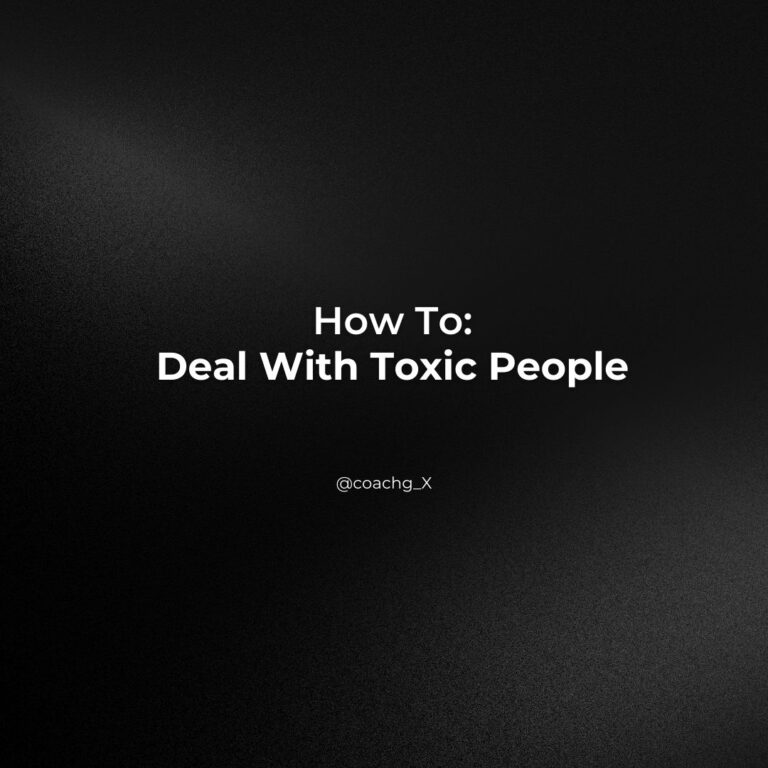
How to Recognize and Protect Yourself from Toxic People
Have you ever felt utterly drained after spending time with someone, even if they seemed nice on the surface? Toxic people can sap your energy, leaving you feeling mentally exhausted and questioning your own worth. These individuals often project an air of false positivity, masking deeper, manipulative tendencies. Some exhibit narcissistic traits, using subtle tactics to keep you under control and make you feel as if you’re the one with the problem. In this post, we’ll study the signs of such people and explore strategies for protecting yourself from their energy-draining influence.
1. Recognizing False Positivity and the Subtle Signs of Narcissism
One of the most confusing aspects of dealing with toxic people is their ability to project false positivity. They may outwardly appear supportive, friendly, or even overly optimistic, but their actions and behavior tell a different story. Here’s how to spot the red flags:
-
- False Positivity: They may offer insincere compliments or make statements that seem uplifting, but there’s an undercurrent of manipulation. They often “play nice” to gain your trust, but deep down, they’re only interested in their own benefit.
-
- Actions vs. Words: Toxic individuals say one thing but do another. They may talk about kindness, honesty, or love but exhibit selfish, controlling, or even cruel behavior in private. Over time, this contradiction between their words and actions becomes more than draining.
-
- Silent Manipulation: Some toxic people use silence as a tool for control. They might avoid communication, leaving you in suspense and uncertainty. This passive-aggressive tactic keeps you guessing, making you feel anxious and often leads to you blaming yourself.
Narcissistic traits can also show up in their behavior. They may view themselves as the center of the world, failing to show empathy and expecting others to conform to their needs. Remember, a narcissist’s goal is to maintain control over their relationships, so they may intentionally avoid clear communication to keep you on edge.
2. How Narcissists Make You Feel Like the Problem
Narcissists have a unique way of making you feel as if you’re the one with issues. Here’s how they do it:
-
- Projecting Their Flaws onto You: Narcissists are experts at projecting their own insecurities and flaws onto others. They might accuse you of being selfish, unkind, or difficult, all while exhibiting those very traits themselves. This projection can make you feel like you’re constantly falling short.
-
- Emotional Manipulation and Guilt: Narcissists are skilled at manipulating emotions to make you feel guilty. They might act hurt or offended if you don’t meet their expectations, even if those expectations are unreasonable. This leaves you questioning your own worth and efforts, wondering what you did wrong.
-
- Withholding Communication as Punishment: A hallmark of toxic, narcissistic behavior is the “silent treatment.” By withholding communication, they make you feel desperate for their approval and attention. This tactic reinforces their control and leaves you feeling anxious and powerless.
It’s essential to remember that their behavior is not a reflection of your worth. Narcissists thrive on making others feel small because it gives them a sense of power and superiority. Realizing this is the first step toward reclaiming your confidence and energy.
3. The Impact of Being Around Toxic People
Being around toxic people doesn’t just drain your energy – it can affect every aspect of your well-being. Here are some of the ways toxic individuals can impact you:
-
- Mental and Emotional Exhaustion: Constantly being manipulated, guilt-tripped, or ignored takes a toll on your mental health. You may feel emotionally drained, anxious, and less capable of dealing with daily challenges.
-
- Erosion of Self-Worth: Over time, toxic individuals can chip away at your self-esteem. They make you question your own judgments and values, making you feel unworthy or unimportant.
-
- Isolation and Self-Doubt: Toxic people often try to isolate you from others by making you doubt your other relationships. They may make subtle comments that lead you to question the loyalty or intentions of others in your life, leaving you more dependent on them.
Recognizing the impact of toxic individuals on your life can be a powerful motivator for change. Once you’re aware of how they’re affecting you, you can take steps to protect yourself and start reclaiming your energy.
4. What to Do When You’re Stuck with a Toxic Person
If you’ve identified a toxic person in your life, it’s time to take action. Here’s a guide to protect your energy and regain control over your emotional well-being:
Stop Trying to Fix Them
One of the most challenging yet essential steps in dealing with toxic people is understanding that you cannot change them. People with deeply ingrained toxic behaviors, especially those with narcissistic traits, are often resistant to change and may not even recognize the need for it. Here’s why trying to fix them is a losing battle and what to do instead:
-
Recognize Their Resistance to Change: Toxic people often resist self-reflection and personal growth. They may dismiss feedback, avoid accountability, or blame others for their problems. By trying to “fix” them, you’ll likely end up frustrated and emotionally drained.
-
Shift Your Focus Back to Yourself: Instead of pouring your energy into changing them, redirect it toward your own well-being and personal boundaries. This shift empowers you to regain control over your emotional state and stop letting their actions dictate your peace.
-
Understand that It’s Not Your Responsibility: Often, people with a caring nature feel a strong urge to help others, even those who are toxic. But it’s crucial to remember that everyone is responsible for their own growth. You can’t force someone to change if they don’t want to, and taking on that responsibility will only wear you down.
-
Embrace Acceptance: Accepting that you can’t change them is freeing. It allows you to focus on what you can control: your reactions, your boundaries, and your well-being. When you stop trying to fix them, you stop being emotionally entangled in their negativity.
Letting go of the need to “fix” toxic people is one of the most empowering steps you can take. By freeing yourself from this burden, you reclaim your energy and create space for relationships that are supportive and positive. Remember, the best way to protect yourself from a toxic person is not to change them, but to change how you engage with them.
Set Clear Boundaries
One of the best ways to protect yourself is to establish boundaries. Let the person know what behaviors are unacceptable and be clear about the consequences. For example, you might say, “I won’t engage in conversations where I feel manipulated or controlled.” Boundaries protect your emotional space and signal that you won’t tolerate manipulative tactic
Practice Emotional Detachment
Detaching emotionally from a toxic person is challenging but necessary. When they engage in manipulation, try to observe their behavior rather than react emotionally. This detachment helps you stay grounded and prevents them from using your emotions against you.
Limit Your Exposure
Whenever possible, reduce the amount of time you spend with them. Toxic people often have a stronger impact the more time you spend around them. By limiting exposure, you reduce their influence and regain control over your emotional energy.
Lean on Supportive Relationships
Surround yourself with people who uplift and support you. Positive relationships serve as a buffer against the toxicity of others, reminding you of your worth and value. Talking to friends, family, or a therapist about your experiences can help you process emotions and gain perspective.
Work on Your Self-Worth
People with strong self-worth are less susceptible to manipulation. Work on building your self-esteem through self-care, setting goals, and celebrating your achievements. A solid sense of self-worth makes it easier to recognize when someone is trying to undermine you.
5. Moving Forward: Reclaiming Your Energy and Peace
Toxic people can cast a dark shadow over our lives, but we have the power to move past their influence. Recognizing their behavior, setting boundaries, and reinforcing your sense of self-worth are the keys to reclaiming your energy and peace.
Remember, you are not the problem. The problem lies with those who seek to control, manipulate, and drain others to feed their own egos. By distancing yourself from such people and surrounding yourself with positive influences, you can create an environment that nurtures growth, joy, and peace.
Ultimately, freeing yourself from the influence of toxic individuals opens up space in your life for true, uplifting relationships. It might feel challenging to set boundaries or distance yourself at first, but in time, you’ll find that protecting your energy is one of the best gifts you can give yourself.
Dealing with toxic individuals, especially those with narcissistic tendencies, is challenging. Their behavior is often insidious, subtly eroding your energy and self-worth. But you don’t have to stay in this cycle. Recognize the signs, take action to protect yourself, and surround yourself with genuine, positive connections. Your peace, energy, and happiness are worth the effort. You deserve relationships that bring out the best in you, not ones that drain you.
Take the first step toward reclaiming your energy today, and know that you’re not alone on this journey.
Let’s Keep the Growth Going
You’ve come this far for a reason. Stay connected and receive insights that meet you where you are—right in your inbox.
- Join our Newsletter -
Share:




